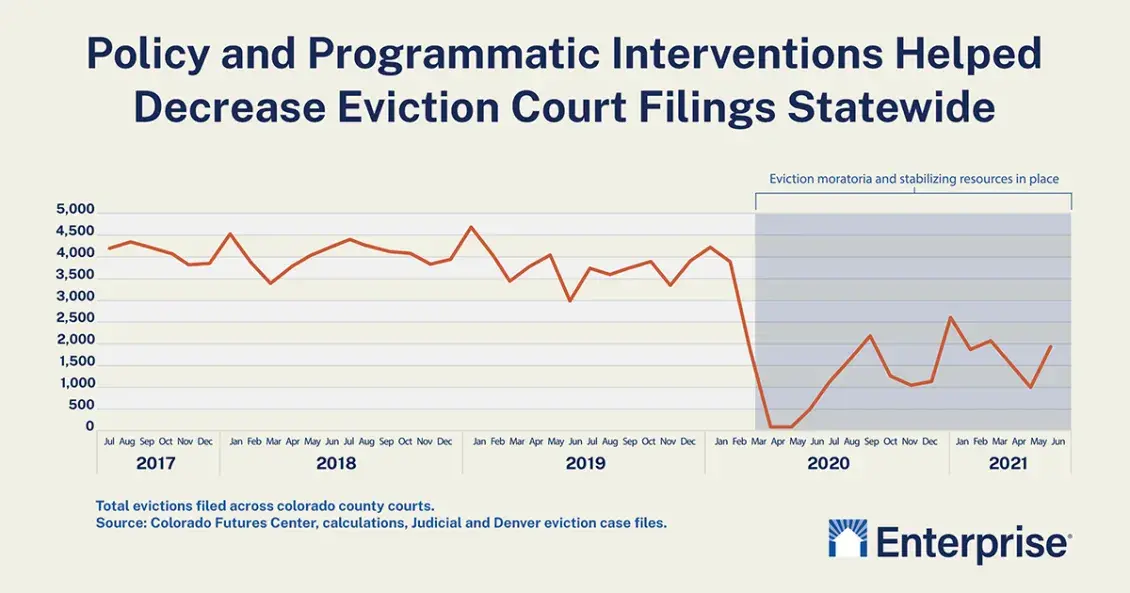DENVER (Oct. 26, 2022) – A report released today by Enterprise Community Partners (Enterprise), based on a new analysis from the Colorado Futures Center, makes robust data about Colorado eviction court filings available to the public for the first time. The report highlights the seriousness of housing instability in the state and the need for consistent data on evictions and recommends long-term measures to reduce evictions and their impact, advance housing stability and create a more equitable housing ecosystem statewide. Both the Enterprise report and Colorado Futures Center analysis were generously supported by The Colorado Health Foundation.
A New Normal: How Eviction Court Filing Data Can Advance a More Stable Housing Ecosystem for all Coloradans uses data from the nearly 150,000 evictions filed in county courts statewide from July 2017-June 2021 to analyze eviction filings by quantity, geography, certain case outcomes and whether landlords and renters had legal representation. The analysis finds that the legal eviction system has historically been biased towards landlords, but pandemic-related rental and legal assistance helped to reduce the number of evictions and their harms in a way that could prove instructive for the future. The report also notes that court filings cannot capture the full scope and impact of evictions or housing instability, as evictions occur in many ways outside the legal process.
Key findings include:
- A total of 148,829 evictions were filed in county courts statewide from July 2017–June 2021.
- From 2019 to 2020, eviction filings fell by 57% as pandemic interventions such as eviction moratoriums and state-provided rental assistance started to go into effect.
- From July 2017–June 2021, in 77% of eviction cases, landlords had legal counsel at some point in the case; the same was true for renters in just over 1% of all cases.
- Eviction judgments were filed against renters in 70% of cases from July 2017–December 2019; but that proportion dropped to 58% in 2020 and 52% in the first half of 2021 due to pandemic-related legal protections and resources.
- In Denver, the only county for which zip code-level information was accessible, eviction filings were highly concentrated in neighborhoods where residents are predominantly lower-income, non-white and particularly vulnerable to involuntary displacement.
“For far too many Coloradans, especially people with low incomes, it is exceptionally difficult to find high-quality, affordable and stable housing. When faced with eviction, they must navigate a complicated system without enough resources in their corner,” said Kinsey Hasstedt, Enterprise’s state and local policy director in Denver. “This new analysis proves that interventions like those we saw during the pandemic made a real difference in preventing evictions across the state. We need more—and more consistent—data from eviction filings, and should use this knowledge to implement long-term, scalable, upstream measures to prevent evictions from being filed in the first place. This would advance an equitable and stable housing system that benefits renters, landlords and Colorado communities as a whole."
A New Normal recommends several ways to better access and utilize eviction court data:
- Make it possible for all county courts and the state Judicial Department to consistently pull and report key information from eviction court filings.
- Ensure the court filings delineate between commercial and residential evictions and make data publicly available at the zip code level.
- Make aggregate data on the number and timing of filings, certain case specifics, such as cause for eviction filing and the legal representation status of both parties, and case outcomes publicly accessible in a user-friendly manner while safeguarding renters’ personally identifiable information.
- Standardize how information for eviction filings is logged and reported across all county courts and ensure interaction across different state agencies’ case management systems to align resources.
"The Colorado Futures Center was proud to partner with Enterprise to better understand evictions in Colorado. However, we are left with unanswered questions that only additional data can answer,” said Jennifer Newcomer, Colorado Futures Center research director. “We look forward to continuing this research with more robust and consistent data statewide.”
About Enterprise Community Partners
Enterprise is a national nonprofit that exists to make a good home possible for the millions of families without one. We support community development organizations on the ground, aggregate and invest capital for impact, advance housing policy at every level of government, and build and manage communities ourselves. Since 1982, we have invested $54 billion and created 873,000 homes across all 50 states, the District of Columbia and Puerto Rico – all to make home and community places of pride, power and belonging. Join us at enterprisecommunity.org.
About Colorado Futures Center
The Colorado Futures Center is a 501(c)(3) organization that is dedicated to research and evaluation that informs fiscal and public policy issues impacting community and state economic health and quality of life.
Media Contact
Jordan Miller
212.784.5703
jmiller@groupgordon.com
